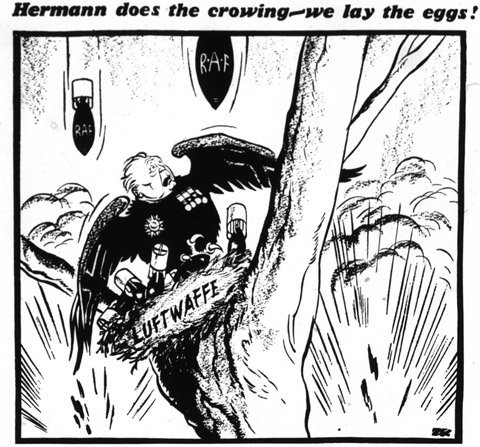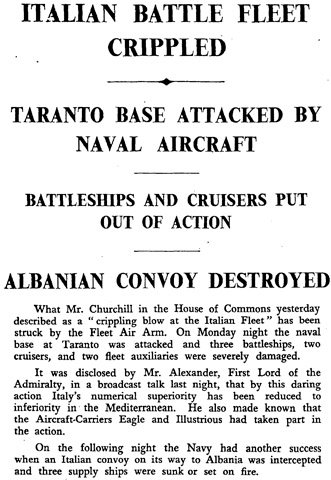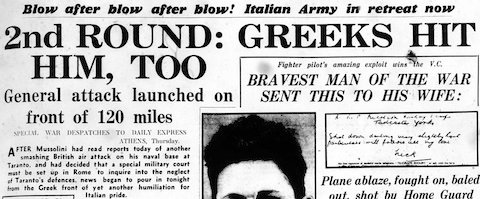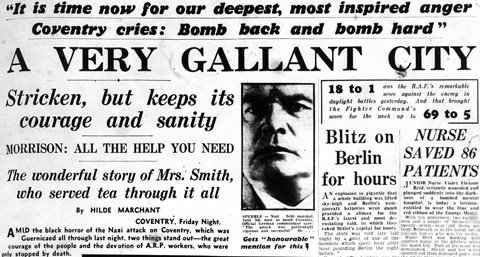
Some inconsistencies in the Daily Mirror's message today. Liverpool was bombed heavily last night in 'One of the most severe raids in the air blitz' (1):
Fire bombs damaged a boys' college and caused casualties; a secondary school was hit by an oil bomb and incendiaries; numbers of houses were destroyed; gas and water mains were fractured. There were no reports of any vital damage to industrial undertakings.
This last statement is presumably the basis for the statement that the raid had 'failed'. However, the Mirror suggests that Liverpool, along the recent lessening of attacks on London and the Coventry raid, 'is a clear indication that Goering is copying the R.A.F. and aiming blows at the production centres and military objectives of the provinces'.
Henceforth, the Germans are expected to copy our devastating raids on military objectives in Germany.
But will they be too late?
In the view of the air experts, they would have achieved considerable success if they had started at the beginning on our military objectives instead of foolishly attempting to break London's morale and win a short war.
Which is the opposite of what actually happened back in August and September, but never mind.

Zec's cartoon on page 5 is entitled 'Hermann does the crowing -- we lay the eggs'. But doesn't 'One of the most severe raids in the air blitz' count as laying eggs? And doesn't yesterday's headline, 'RAF ON TOP IN BOMBING', count as crowing? The Manchester Guardian says that 'Axis propaganda continues to gloat over Coventry [...] so as to weaken the impression made on many minds by Taranto, the Italian reverses in Greece, and the bombing of Munich' (8). Could it not be suggested that British propaganda gloats over British successes so as weaken the impression made by Coventry, and the bleak prospect of a long war full of more of the same?
Having said that, an 'R.A.F. expert' has told the the Guardian that he is 'firmly convinced that the cure' for the night bomber 'will be found, possibly by both sides, and eventually night bombing is likely to diminish is the same way that heavy day bombing has decreased' (6). He gives no details other than to note that there's no one answer, but that British anti-aircraft defences are pushing the raiders up higher and higher, and turning back more and more.
And on the propaganda-and-air-defence front, Sir Nevile Henderson, former ambassador to Germany, is in the news today after making some remarks about the Sudeten crisis. The Times headlines its small article 'Opportunity missed by Hitler' (2). Referring to the former prime minister, who passed away earlier this month, Henderson said:
"I do not know whether the critics of Mr. Chamberlain realize that on September 29, 1938, we did not possess any Spitfires, we had only one or two experimental Hurricanes, and only seven modern A.A> guns for the defence of London, out of 400 estimated as the minimum necessary. Germany could have dropped 2,000 bombs a day on London, and we could have given no reply.
In its much more prominent account ('A new Munich scandal told', 1), the Mirror gives more quotes from Henderson, and a very different spin to The Times:
"Goering meant to make my blood run cold when he told me: 'If you insist on making war, before the end there will be very little left of London and absolutely nothing of Czechoslovakia.'
"He was undoubtedly perfectly correct in saying so."
According to the Mirror, Henderson's statements, while meant as a defence of appeasement, are instead 'a condemnation of the policy which allowed such a state of affairs to exist and of the Ministers who supported it -- yet still remain in office'. Pointedly, it names them: Lord Halifax, Lord Simon, Malcolm MacDonald and Sir Kingsley Wood. Nowhere is the phrase 'Guilty Men' mentioned, but the implication is clear.
![]() This work is licensed under a Creative Commons Attribution-NonCommercial-NoDerivatives 4.0 International License.
Permissions beyond the scope of this license may be available at http://airminded.org/copyright/.
This work is licensed under a Creative Commons Attribution-NonCommercial-NoDerivatives 4.0 International License.
Permissions beyond the scope of this license may be available at http://airminded.org/copyright/.





Erik Lund
It sounds as though you're picking up a sour note --which wouldn't be surprising. If I'm counting it out right, the BSA plant was hit last night and one of the main factory blocks collapsed on its bomb shelter. As far as rescuers frantically digging in the rubble knew when this paper was put to bed (and read), up to 1500 workers were still trapped inside. Although the final death toll was "only" 53, Google isn't yielding totals wounded. Because no-one was counting (I also find accounts of anonymous mass graves in Birmingham!), or because no-one was reporting?
And in some ways, IIRC, the first night of the attack on Liverpool was worse.
Brett Holman
Post authorI can't find any totals of wounded for BSA either. John Ray says 50 killed, with 450 killed in Birmingham as a whole and 540 'badly hurt' (The Night Blitz, 165). That's a good point that rescue work would have been still ongoing at this point and journalists/editors (to the extent that they knew of such things outside of official reports) may have picked up on such uncertainties in their phrasing.